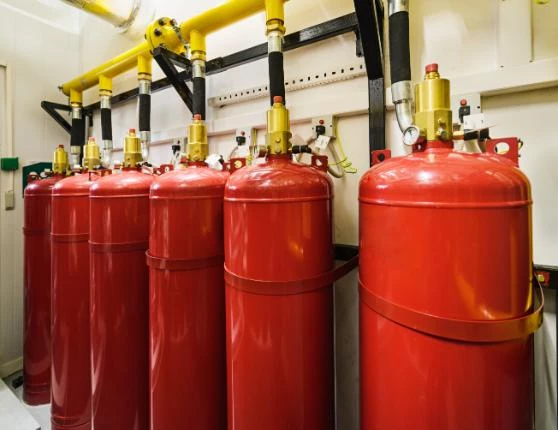
Fire Suppression Systems in Norfolk
Get In TouchAt Fire Protection Services, we specialise in the design, installation, and maintenance of fire suppression systems for properties in Norfolk.
Fire suppression systems are critical in protecting people, assets, and infrastructure by automatically controlling or extinguishing fires before they spread.
Our team delivers end-to-end solutions, from initial consultation and risk assessment through to installation, testing, and ongoing servicing, ensuring every system is safe, effective, and reliable.
What are the Different Types of Fire Suppression Systems?
The main types of fire suppression systems are:
Wet pipe sprinkler systems in Norfolk - Pipes remain filled with water. Sprinkler heads activate under heat and discharge water directly. Reliable and low cost but unsuitable where freezing is possible.
Dry pipe sprinkler systems in Norfolk - Pipes are filled with pressurised air or nitrogen. Water enters only when a sprinkler activates. Used in unheated areas because they prevent pipe freezing.
Pre-action systems - Pipes stay dry until fire detection confirms a threat. They need two triggers before water discharges. This prevents accidental damage in sensitive areas like data centres.
Deluge systems - All sprinklers are open. When triggered, water floods the area instantly. Used in high-hazard sites such as chemical plants or aircraft hangars.
Gas suppression systems in Norfolk - Inert gases or chemical agents (e.g. FM-200, Novec 1230, CO₂) displace oxygen or interrupt combustion. Ideal for server rooms, archives and control centres.
Foam suppression systems in Norfolk - Foam blankets fuel, cutting oxygen and cooling the fire. Used where flammable liquids are present.
Water mist systems in Norfolk - High-pressure mist absorbs heat and displaces oxygen. Effective with minimal water damage, often used in heritage buildings, transport and healthcare.
Dry chemical systems in Norfolk - Powders interrupt the chemical reaction of fire. Common in industrial settings and vehicle suppression.
Each fire suppression type is chosen because the agent and discharge method must match the fire risk and environment.
How much does a Fire Suppression System Cost in Norfolk?
The average cost of fire suppression system in Norfolk ranges from £1,000 to £10,000, depending on the system type, building size, and the level of protection required.
Costs for installing fire suppression systems in NR17 2 are primarily influenced by whether a smaller kitchen suppression unit or a large-scale gas or water mist system is needed, the complexity of pipework and equipment installation, the scale of coverage required, and the inclusion of ongoing maintenance and testing to ensure compliance.
Contact Fire Protection Services to get customised prices for installing a fire suppression system at your property.
Why are Fire Suppression Systems Essential for Properties in Norfolk?
Fire suppression systems are essential for properties in Norfolk because they provide rapid fire control that protects life, assets and business continuity.
Suppression systems reduce risk because they activate automatically, often before the fire grows beyond control. They minimise structural damage because they contain or extinguish flames quickly.
Fire suppression systems protect critical equipment because agents such as gas or mist cause less collateral harm than water. They ensure compliance because many high-risk environments require suppression under regulations or insurance conditions.
Is it a Legal Requirement to have a Fire Suppression System?
In the UK it is not a blanket legal requirement to have a fire suppression system. The law requires suitable fire precautions under the Regulatory Reform (Fire Safety) Order 2005.
Fire suppression sysems in Norfolk becomes mandatory only in certain high-risk or specific building types, including:
Commercial kitchens often require suppression because cooking equipment presents high fire risk.
Some high-rise residential buildings and care homes may be required to install sprinklers under Building Regulations.
Warehouses storing hazardous or highly flammable goods may need suppression to meet insurance and regulatory standards.
In all cases, the duty holder must carry out a fire risk assessment. If the assessment shows suppression is necessary to protect life or property, then it becomes a legal requirement for that site.
Which Types of Buildings Require Fire Suppression Solutions?
Properties in Norfolk that benefit from fire suppression systems include:
Server rooms and data centres - Protecting sensitive IT equipment from fire and smoke damage.
Manufacturing plants - Reducing risks in production areas with machinery and flammable materials.
Chemical storage facilities - Containing potential hazards from volatile or combustible substances.
Commercial kitchens - Suppressing grease and cooking-related fires quickly and effectively.
Warehouses and distribution centres - Safeguarding goods, stock, and staff in large storage areas.
Healthcare premises - Ensuring safe evacuation and protecting vulnerable occupants.
High-occupancy buildings - Providing rapid response where large numbers of people are at risk.
Can Suppression Systems be Integrated with Existing Fire Protection Measures?
Modern fire suppression systems in Norfolk can be integrated seamlessly with existing fire alarms, emergency lighting, and monitoring systems.
This integration ensures a coordinated response to fire events, with alarms, suppression discharge, and evacuation procedures all triggered automatically.
What are Fire Suppression Systems?
Fire suppression systems are fixed installations that control or extinguish fires using substances other than water.
Suppression systems in Norfolk detect fire automatically or activate manually. Suppression agents include gas, foam, dry chemicals or mist.
The fire suppression system reduces fire damage because it releases the agent directly into the risk area, lowering heat and oxygen or coating fuel sources. They are widely used in data centres, kitchens, plant rooms and high-risk industrial sites where water could cause more harm than fire.
We cover Norfolk
